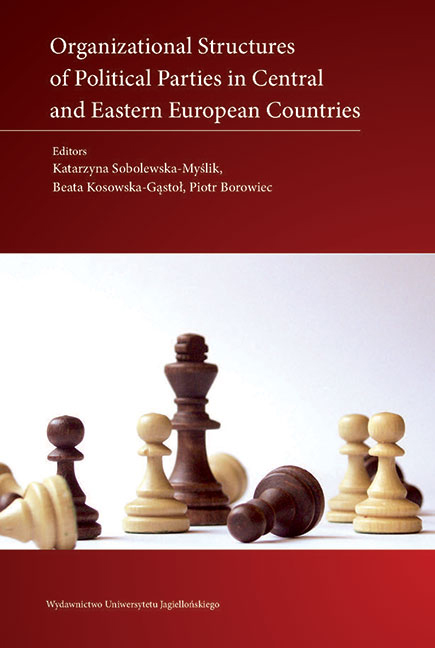Book contents
- Frontmatter
- Contents
- Preface
- Developing Party Structures in Central and Eastern Europe
- Albania: Organizations of Political Parties in Albania
- Belarus: Belarusian Political Parties: Organizational Structures and Practices
- Bosnia and Herzegovina: Organizational Structures of Political Parties in CEE Countries: A Case Study on Bosnia and Herzegovina
- Bulgaria: Organizational Structure and Trends in Bulgarian Party Politics
- Croatia: Organizational Structures of Political Parties in Croatia
- Czech Republic: Between Organizational Extremes: Czech Parties after a Political Earthquake
- Estonia: Organizational Structures of Political Parties in Estonia
- Hungary: Cut from the Same Cloth? A Comparative Analysis of Party Organizations in Hungary
- Kosovo: Structure of the Main Political Parties in Kosovo
- Latvia: Leader-Centered and Power-Hungry: Party Organizations in Latvia
- Lithuania: Organization of Political Parties: The Case of Lithuania
- Moldova: Organizational Structures of Political Parties in The Republic of Moldova
- Montenegro: Party Organization in Montenegro: Structural Resemblance Behind Political Divergence
- Poland: Structures of Polish Political Parties in the Second Decade of the 21st Century
- Romania: The Internal Organization of Romanian Political Parties
- Russia: Parties with Roots Growing Upwards: Organizational Features of Russian Political Parties
- Serbia: Organizational Structures of Political Parties in Serbia
- Slovakia: Organizational Structures of Political Parties in Slovakia: Parties not for Members
- Slovenia: Almost without Any Innovations: Organizational Structures in Slovenian Parties
- Ukraine: Shallow Party Structures in a Volatile Party System
- Comparing Organizational Structures of Political Parties in Central and Eastern European Countries
- Biographical notes about the authors
Moldova: Organizational Structures of Political Parties in The Republic of Moldova
- Frontmatter
- Contents
- Preface
- Developing Party Structures in Central and Eastern Europe
- Albania: Organizations of Political Parties in Albania
- Belarus: Belarusian Political Parties: Organizational Structures and Practices
- Bosnia and Herzegovina: Organizational Structures of Political Parties in CEE Countries: A Case Study on Bosnia and Herzegovina
- Bulgaria: Organizational Structure and Trends in Bulgarian Party Politics
- Croatia: Organizational Structures of Political Parties in Croatia
- Czech Republic: Between Organizational Extremes: Czech Parties after a Political Earthquake
- Estonia: Organizational Structures of Political Parties in Estonia
- Hungary: Cut from the Same Cloth? A Comparative Analysis of Party Organizations in Hungary
- Kosovo: Structure of the Main Political Parties in Kosovo
- Latvia: Leader-Centered and Power-Hungry: Party Organizations in Latvia
- Lithuania: Organization of Political Parties: The Case of Lithuania
- Moldova: Organizational Structures of Political Parties in The Republic of Moldova
- Montenegro: Party Organization in Montenegro: Structural Resemblance Behind Political Divergence
- Poland: Structures of Polish Political Parties in the Second Decade of the 21st Century
- Romania: The Internal Organization of Romanian Political Parties
- Russia: Parties with Roots Growing Upwards: Organizational Features of Russian Political Parties
- Serbia: Organizational Structures of Political Parties in Serbia
- Slovakia: Organizational Structures of Political Parties in Slovakia: Parties not for Members
- Slovenia: Almost without Any Innovations: Organizational Structures in Slovenian Parties
- Ukraine: Shallow Party Structures in a Volatile Party System
- Comparing Organizational Structures of Political Parties in Central and Eastern European Countries
- Biographical notes about the authors
Summary
Introduction
Analyzed in this chapter are the most important aspects of the internal organization of Moldavian political parties. It was very important for Moldavian researchers to present the experience of Moldavian parties in a complex comparative context. The Moldavian party system is still young and political parties are not yet institutionalized. This is why it is very important to study issues such as: the legal regulation of parties, party structures, relations between leaders and organizational structures, party membership, and other issues. To ensure that this research was appropriately representative of the Moldavian political scene, we selected five parliamentary parties. The conclusions submitted will help us to better understand the specifics of political processes in Moldova.
Key Legal Solutions Devoted to the Creation and Function of Political Parties
The legal framework governing political parties in Moldova is a product of over twenty years of national independence. There are two main legal acts concerning the activity of political parties: the Constitution of the Republic of Moldova (1994) and the Law on Political Parties (2007). In addition to these documents, there are other legal acts with specific regulations regarding political parties, such as the Election Code of 1997, but these will not be the subject of this study. However, the statues of parties are relevant for this article. We will focus on five political parties that have been in the Moldovan Parliament since the national elections of 30 November, 2014: the Socialist Party of the Republic of Moldova (Statute of SPRM from 2013); the Liberal Democratic Party of Moldova (Statute of LDPM from 2011); the Communist Party of the Republic of Moldova (Statute of CPRM from 2008); the Democratic Party of Moldova (Statute of DPM from 2012); and the Liberal Party (Statute of LP from 2014).
The Constitution of the Republic of Moldova contains provisions on political parties. Naturally, they are of a general nature and do not expressly relate to the organization of parties. Nevertheless, the constitution does include a framework for their organization and operation.
- Type
- Chapter
- Information
- Organizational Structures of Political Parties in Central and Eastern European Countries , pp. 277 - 294Publisher: Jagiellonian University PressPrint publication year: 2017



